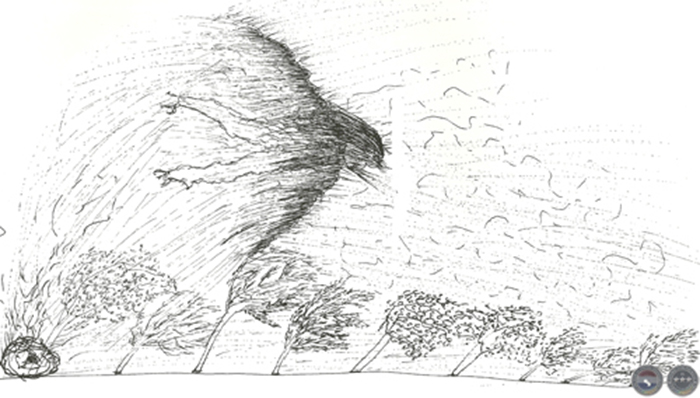Professor
Javier Corvalan [PY]

Los espiritus de las tormentas embrujados por las golondrinas, Ogwa Flores B., 1991
O2 Factory II.
Concert in the Forest
Rome is no longer the center of the world or that of an empire. Venice is no longer the center of a republic.
How long where they?
Some sustain that, in the modern world, cities cannot survive for 200 years or as original cities, even though they continue to be inhabited and exist physically.
Modernity, with the automobile at the forefront, thought and constructed cities. Detroit constructed automobiles. Porto Marghera, fuel for automobiles.
Today there is increasingly a great effort to reduce the space gained by the automobile, dismantling infrastructure and placing the pedestrian and bicycle, once again, as protagonists of the urban space.
There are known several cities in transition and in the process of dismantlement, replacing built spaces for green ones. Health and quality of life impose themselves over burdensome car traffic and toxic environmental pollution.
We cannot think the city of the future, the one needed for the construction of a better society, without thinking of reducing the ecologic footprint.
Porto Marghera must regenerate. It must dismantle its inhospitable construction in exchange of livable spaces, and rehabilitate its infrastructure into architecture with multiple uses.
This workshop proposes three scales of intervention.
First: the urban scale. A new master plan for Porto Maghera that infuses a fresh purport into the city, disarming and demolishing and building yet again with that which has been demolished (Dimitris Pikonis)
Second: the human scale. Identifying a public space where human encountering is celebrated, an agora. A forest-like agora. The construction of the forest will be elaborated while researching the structural system known as “branch structure”, applying the funicular and anti-funicular concept (Frei Otto).
Third: the musical scale. A concert as a representation, celebration, and final show.
Fabbrica di O2 II.
Concerto nel Bosco.
Roma non è più il centro del mondo e di un impero. Venezia non è più il centro di una repubblica.
Per quanto tempo lo furono?
Alcuni sostengono che, nel mondo moderno, non ci sono città che sopravvivono 200 anni o che sopravvivono come città originali, anche continuando a essere abitate ed esistendo fisicamente.
La modernità, e il grande cambiamento portato dall’automobile, pensò e portò alla costruzione di città diverse. Detroit costruì automobili, Porto Marghera combustibile per automobili.
Oggi si sta compiendo un grande sforzo per ridurre lo spazio vinto dall’automobile smontando infrastrutture e ricominciando a pensare il pedone e la bicicletta come protagonisti dello spazio urbano.
Si conoscono molte città in transizione e in processo di smontaggio: si rimpiazzano spazi costruiti con spazi verdi. La salute e la qualità della vita si impongono sulla mobilità di veicoli pesanti e sulla contaminazione ambientale.
Non possiamo pensare una città per il futuro per una società migliore senza pensare di ridurre l’impronta ecologica.
Porto Marghera ha bisogno di rigenerarsi, bisogna smontare tutte le sue costruzioni inabitabili per costruire uno spazio abitabile, riabilitare la sua infrastruttura come architettura dai molteplici usi.
Bisogna smontare e costruire un bosco.
Il lavoro di questo workshop pianificherà tre scale di intervento.
La prima è la scala urbana: un nuovo master plan per Porto Marghera che dia nuovo senso alla città. Smontare e demolire per tornare a costruire con i resti della demolizione (Dimitris Pikionis).
La seconda, la scala umana, identifica uno spazio pubblico dove si celebra l’incontro, un ágora. Un bosco come ágora. La costruzione del bosco si farà attraverso un’analisi strutturale del sistema conosciuto come “brunch structure”, applicando il concetto di funicolare e anti funicolare (Frei Otto).
La terza, la scala musicale, è un concerto come rappresentazione, celebrazione e mostra finale.
